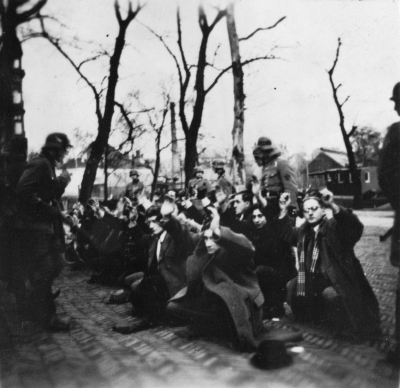Despite Dutch neutrality, Nazi Germany invaded the Netherlands on 10 May 1940 as part of Fall Gelb (Case Yellow). On 15 May 1940, one day after the bombing of Rotterdam, the Dutch forces surrendered. The Dutch government and the royal family relocated to London. Princess Juliana and her children sought refuge in Ottawa, Canada until after the war.
The invaders placed the Netherlands under German occupation, which lasted in some areas until the German surrender in May 1945. Active resistance, at first carried out by a minority, grew in the course of the occupation. The occupiers deported the majority of the country's Jews to Nazi concentration camps.Due to the high variation in the survival rate of Jewish inhabitants among local regions in the Netherlands, scholars have questioned the validity of a single explanation at the national level. In part due to the well-organized population registers, about 70% of the country's Jewish population were killed in the course of World War II a much higher percentage than in either Belgium or France. In 2008 records were opened that revealed the Germans had paid a bounty to Dutch police and administration officials to locate and identify Jews, aiding in their capture. Uniquely among all German-occupied areas, communists in and around the city of Amsterdam organized the February strike a general strike (February 1941) to protest against the persecution of Jewish citizens.
World War II occurred in four distinct phases in the Netherlands:
September 1939 to May 1940: After the war broke out, the Netherlands declared neutrality. The country was subsequently invaded and occupied.
May 1940 to June 1941: An economic boom caused by orders from Germany, combined with the "velvet glove" approach from Arthur Seyss-Inquart, resulted in a comparatively mild occupation.
June 1941 to June 1944: As the war intensified, Germany demanded higher contributions from occupied territories, resulting in a decline of living-standards. Repression against the Jewish population intensified and thousands were deported to extermination camps. The "velvet glove" approach ended.
June 1944 to May 1945: Conditions deteriorated further, leading to starvation and lack of fuel. The German occupation authorities gradually lost control over the situation. Fanatical Nazis wanted to make a last stand and commit acts of destruction. Others tried to mitigate the situation.The Allies liberated most of the south of the Netherlands in the second half of 1944. The rest of the country, especially the west and north, remained under German occupation and suffered from a famine at the end of 1944, known as the "Hunger Winter". On 5 May 1945 total surrender of all German forces led to the final liberation of the whole country.
The February strike (Dutch: Februaristaking) was a general strike in the German-occupied Netherlands in 1941, during World War II, organised by the then-outlawed Communist Party of the Netherlands in defence of persecuted Dutch Jews and against the anti-Jewish measures and activities of the Nazis in general.
The direct causes were a series of arrests and pogroms held by the Germans in the Jewish neighbourhood of Amsterdam, the Jodenbuurt. It started on 25 February 1941 and lasted for two days; on 26 February, 300,000 people joined the strike. The strike was harshly suppressed by the Germans after three days.The 1941 February Strike is considered to be the first public protest against the Nazis in occupied Europe, and the only mass protest against the deportation of Jews to be organized by non-Jews.

1941Feb, 25
February strike: In occupied Amsterdam, a general strike is declared in response to increasing anti-Jewish measures instituted by the Nazis.
Choose Another Date
Events on 1941
- 17Mar
Franklin D. Roosevelt
In Washington, D.C., the National Gallery of Art is officially opened by President Franklin D. Roosevelt. - 26Jul
French Indochina
World War II: In response to the Japanese occupation of French Indochina, US President Franklin D. Roosevelt orders the seizure of all Japanese assets in the United States. - 17Sep
Great Patriotic War
World War II: A decree of the Soviet State Committee of Defense, restoring Vsevobuch in the face of the Great Patriotic War, is issued. - 12Dec
Hungary
World War II: The United Kingdom declares war on Bulgaria. Hungary and Romania declare war on the United States. India declares war on Japan. - 14Dec
Thailand
World War II: Japan signs a treaty of alliance with Thailand.

 English
English  español
español  français
français  português
português  русский
русский  العربية
العربية  简体中文
简体中文 